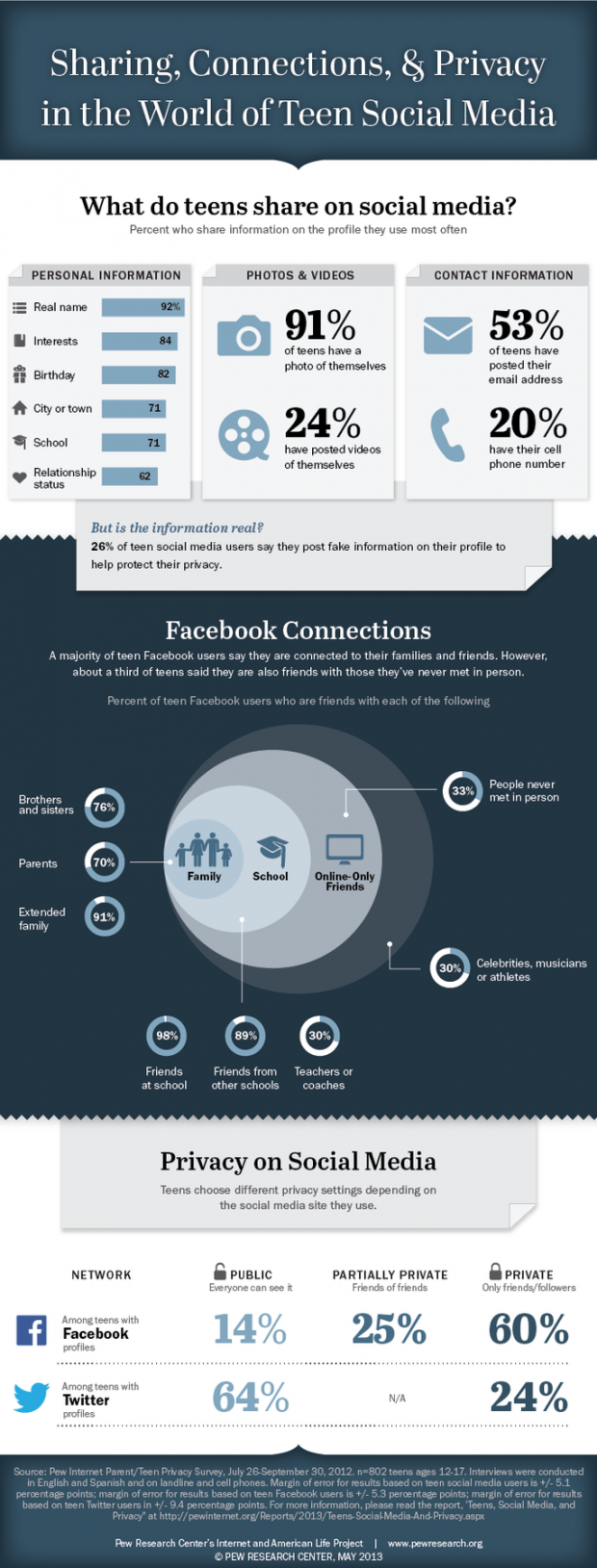A new Pew Research study of 802 teenagers ages 12-17 and their parents reveals that teenagers are sharing more information on social networking sites than in the past, even as they carefully monitor and manage their profiles. And, while the number of social media sites and ways to share has grown, most teens aren’t concerned with third parties having access to their personal information.
Some highlights:
- Today’s teens are sharing more personal information on social media sites: 91% share a photo of themselves with their profile (up from 79% in 2006), 92% use their real name on their most-used profile, and 20% include their cell phone number. And while older teens are more likely to share information like photos of themselves, school names and relationship status than younger teens, boys and girls “generally share personal information... at the same rates.” However, cell phone numbers are a key exception - boys are much more likely to share their cell phone numbers (26%) than girls (14%).
- Twitter use has grown significantly among teens, rising in popularity from 16% in 2011 to 24% in 2012. African-American teens are more likely to use Twitter than white teens, 39% to 23%, respectively, and Twitter users are much more likely than Facebook users to make their posts public.
- “The typical teen Facebook user has 300 friends, while the typical teen Twitter user has 79 followers.” Girls and older teens (ages 14-17) have larger networks on social media, and also have a larger variety of friends, drawing from different groups. Younger teens (ages 12-13) are less likely to friend people they don’t know, kids who attend different schools, or teachers and coaches. Girls are more likely than boys (37% to 23%) to be Facebook friends with teachers and coaches, and African-American teens are “twice as likely as whites” to be Facebook friends with celebrities, professional athletes and musicians (48% to 25%).
One of the most fascinating findings from the study’s focus groups was teens’ “waning enthusiasm for Facebook.” Reasons for the shift include increased adult presence on Facebook, friends’ need to share too much information or “inane details,” and negative reactions to “drama” that frequently occurs on the site between friends. Yet most online teens still use the site, as they believe they need to be there for socializing and not missing out: “While Facebook is still deeply integrated in teens’ everyday lives, it is sometimes seen as a utility and an obligation rather than an exciting new platform that teens can claim as their own.”
The study “wanted to understand the broader context of teens’ online lives beyond Facebook and Twitter,” and found that, overall, teens report more positive social media experiences than negative ones: 52% of teens say they had an experience online “that made them feel good about themselves,” and 33% report having an online experience that made them feel closer to another person. But some teens are also having negative experiences. One in six have been contacted online by a stranger in a “way that made them feel scared or uncomfortable,” and online girls are more than twice as likely as boys to report unwanted contact from strangers (24% vs. 10%).

Privacy Settings, Sharing and Third Parties
According to the report, 60 percent of teen Facebook users keep their profiles private, with girls being “substantially more likely” than boys to restrict profile access. More than half of all teens, 56%, say it’s “not difficult at all” to manage privacy settings on their Facebook accounts, and a majority allow their parents and friends to see the same information in their Facebook feeds -- only 5% of teens take steps to limit what parents can see.


